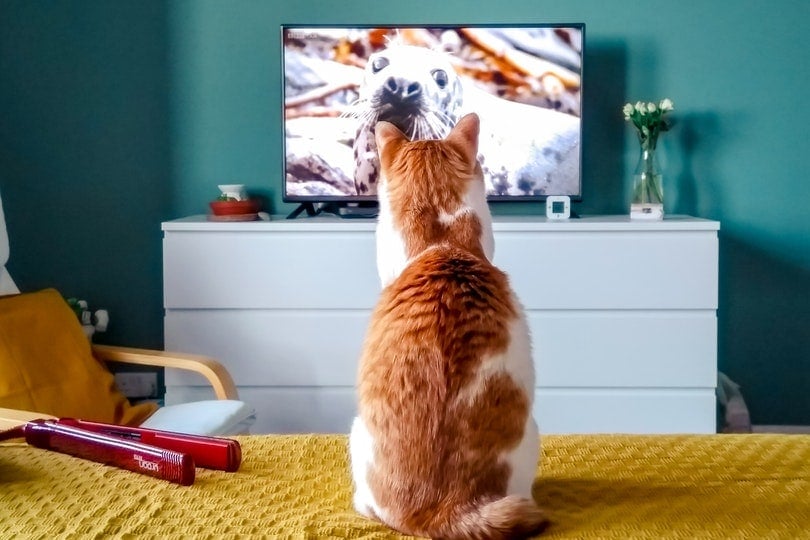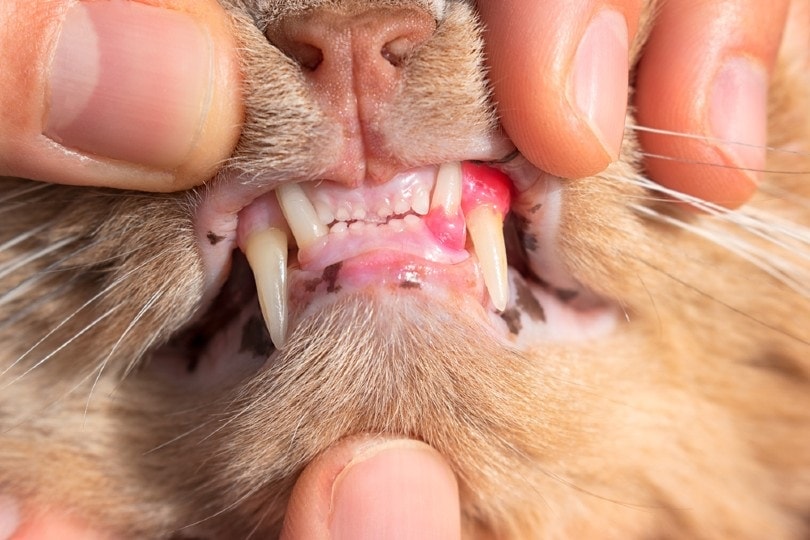Why Do Cats Like Their Ears Rubbed? 5 Vet Reviewed Reasons

Updated on
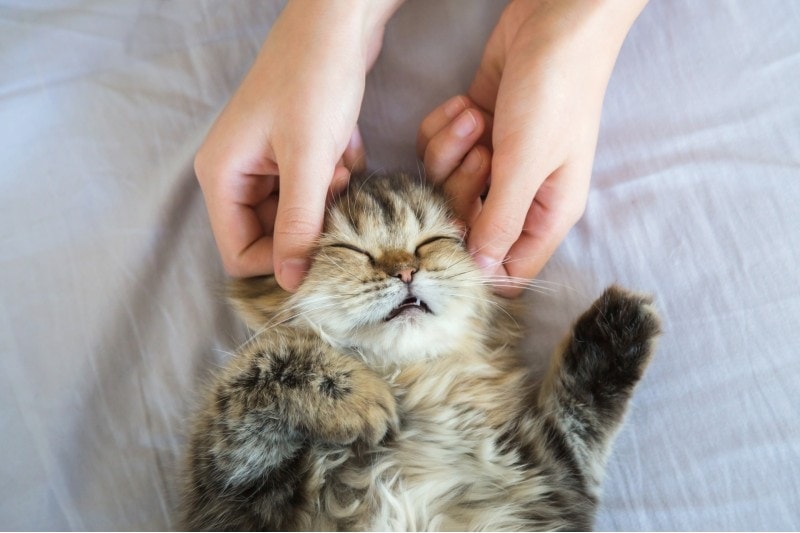
A cat’s ears are awfully cute. They are soft, pointy, and have a language of their own. It’s not a wonder we are drawn to them and always attempting to rub them.
Thankfully, most felines also love it when you rub their ears. They appear relaxed and will purr loudly in appreciation. But have you ever wondered why your cat loves it when you stroke their ears? Well, today is your lucky day.
Read on to learn five likely reasons why cats like their ears rubbed. We also show you the right way to do it as a bonus. Let’s dive in.
The 5 Likely Reasons Cats Like Their Ears Rubbed
1. It Feels Good
Mother cats usually lick their kittens including their ears during grooming. This action causes a surge in oxytocin in the mother and the kittens, making the experience pleasurable and comforting. The gesture is not limited to mothers and their kittens. Adult cats also groom each other to display affection for one another.
You can mimic the sensation your cat experiences during grooming by rubbing their ears. Most cats enjoy being fussed over by their humans, usually on their schedule, of course, and thus crave your attention and love.
2. It Makes Them Calm and Relaxed
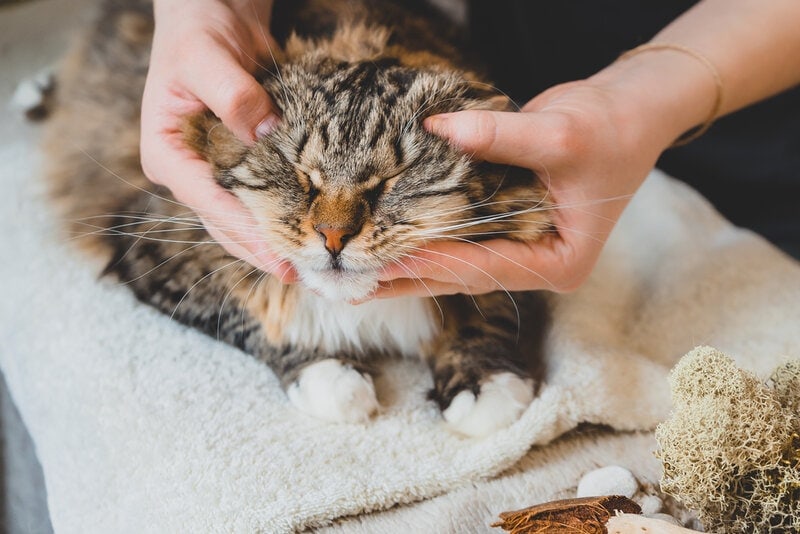
Rubbing your cat’s ears can cause them to purr and consequently release endorphins in the body. Apart from relieving pain, endorphins may reduce stress and improve your cat’s well-being.
It might be difficult to imagine that a cat could feel stressed. But that’s because the felines are good at hiding it. Unlike dogs, cats are not as expressive with their emotions.
However, felines are very sensitive, and any drastic environmental changes can cause a surge in stress levels. That could include changing routine, guests in the house, moving, or a new pet or baby in the home.
3. They Love Attention
Cats might seem aloof, but they like to feel loved and admired. They expect you to spend time with them besides providing basic needs such as food, water, and clean litter. Petting is one way you can offer your cat much-needed attention. And what better spot to do it than the ears?
A cat’s ears have glands that secrete oil and pheromones that cats use for communicating with other felines and to leave their scent or mark the territory.
4. It Strengthens Your Bond
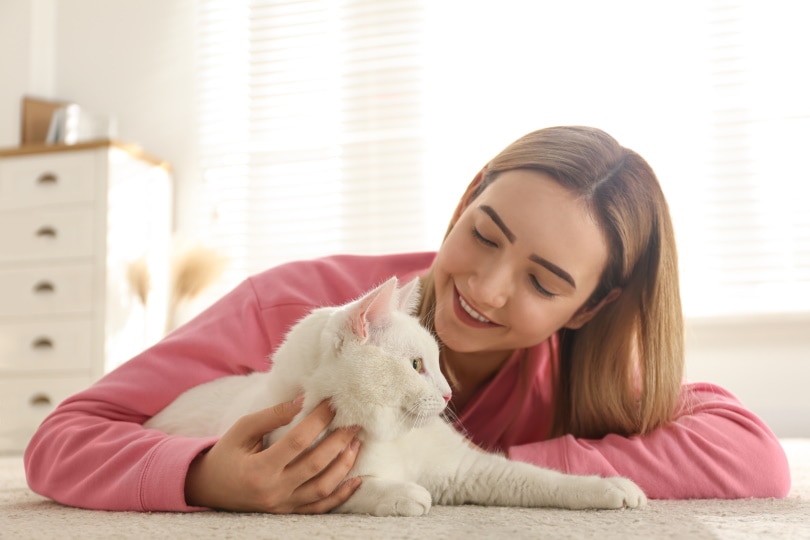
Pheromones do more than make your furry friend feel relaxed and happy. Cats also leave them behind when they rub against you or other objects to mark their territory.
Apart from the ears, the scent-secreting glands are also on the face, head, flanks, bottom and tail. Whenever your kitty rubs any of these parts against you, they may claim you as theirs.
Therefore, the scent left on your body when you rub your cat’s ears may help strengthen the bond between you two. It marks you as belonging to them.
5. Their Ears May be Itchy
Cats can also suffer from ear inflammation and infection, although not nearly as often as dogs do. If their ears are irritated or they have scabs in the area, they may be particularly fond of you rubbing them to relieve the itching. It’s also a good way to keep an eye on your cat’s ears so you can promptly notice any skin irritation, wounds, swelling or discharge that need veterinary attention.
How to Rub Your Cat’s Ears
Unfortunately, every cat is different, and your approach has to be tailor-made. However, you can follow the following steps.
Develop Trust
If your cat doesn’t trust you, you risk spooking them or being bitten. So, if you are petting them for the first time, approach them with care. Better yet, let them come to you. Also, don’t go straight for the ears. Instead, start by gently stroking their head to establish trust. You can gradually move to the ears if the feline doesn’t mind your advances.

Ease Into It
Start with a gentle rub and watch out for their reaction. It is advisable to back away if they demonstrate displeasure.
You can also try some light scratching and very gentle twisting. Some cats will even like it when you lightly rub a knuckle against the ears. Never pinch their ears!
Be Consistent
There is no one-fits-all method for rubbing your cat’s ears. Some prefer a light touch, while others will want a firmer hand. The trick is finding your furry friend’s sweet spot.
If you find something that works, be consistent. Cats have very sensitive ears and can be aggressive if you touch the wrong spot or become too rough in an attempt to switch things up.
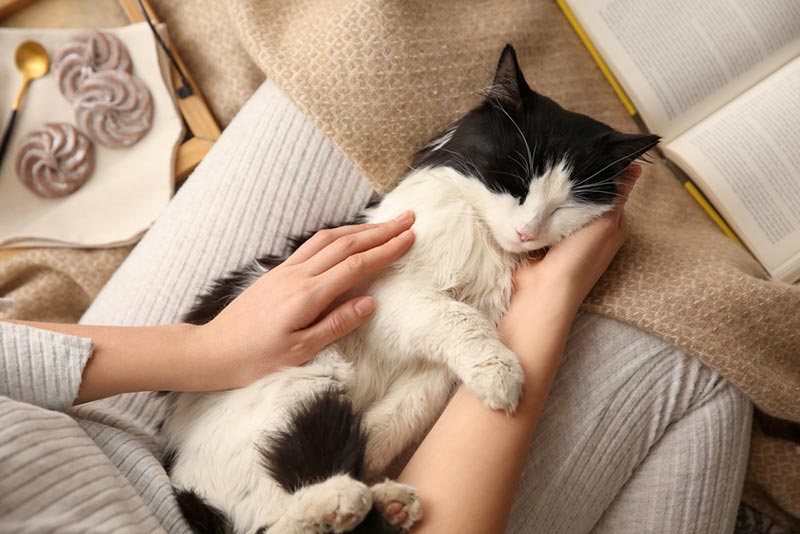
How to Tell If Your Cat Likes Their Ears Rubbed
Not all felines like their ears rubbed. So, don’t force the issue if the kitty expresses their displeasure. But how can you tell if your cat likes their ears rubbed?
A cat that likes their ears rubbed will appear relaxed when you do it. They will purr while half-closing its eyes.
How to Tell If Your Cat Does Not Like Their Ears Rubbed
On the other hand, a kitty that is not enjoying will growl, flatten their ears, twitch, and thrash their tail. They might also shift uncomfortably, leave, or turn their head from you. Sometimes they can scratch or bite you in extreme cases.
However, all cats will not react the same in such uncomfortable situations. While some are that direct, others choose to remain passive. They won’t enjoy the rubbing. But they will tolerate it rather than act aggressively.
Understanding your cat’s behavior is imperative. It will let you know your furry friend’s likes and dislikes, thus improving your relationship.
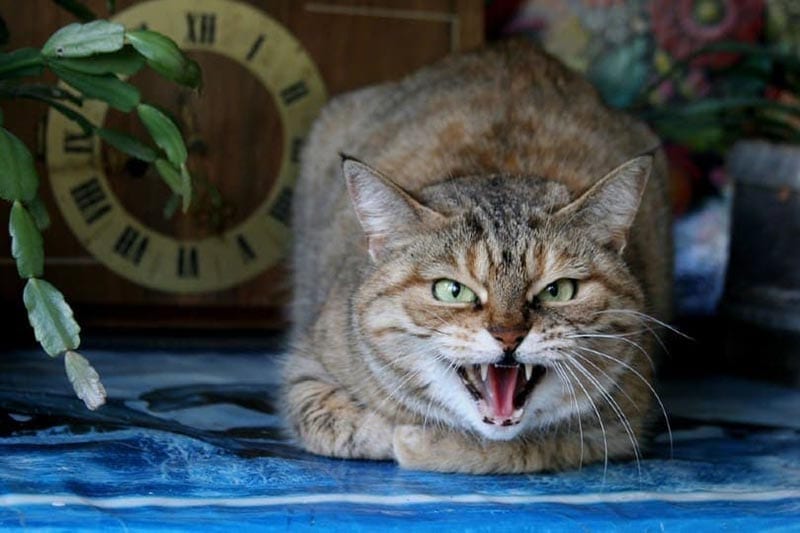
Why Your Cat Doesn’t Like Their Ears Rubbed
Cats are unpredictable. One moment they are rubbing against your feet, and in another, they are growling at you as you attempt to pick them up. So, the reason your kitty didn’t let you rub their ears may not be straightforward.
Not all felines like their ears touched. If yours falls in this category, be content in petting other parts of their bodies since you cannot do much.
However, most cats react positively to having their ears touched. It is, therefore, more likely that one of the following things went wrong the first time you tried.
Your Cat’s Ears May be Painful
If your cat has a wound around the base of the ear, or an actual ear infection, their ear will be painful and they may dislike you rubbing it. Get your cat checked out by a vet if they are suddenly not allowing you to rub their ears.
You Chose the Wrong Time
Cats are not always in the mood for petting. Although they enjoy your company, they are also independent creatures who crave personal space.
Perhaps you tried making your move during kitty’s alone time. Naturally, it will reject your advances during such times. The good news is that you can try again when your furry friend is in a better mood.
You Are Doing It Wrong
Did you rub your kitty’s ears too hard the last time? It could be the reason they reacted negatively. Cats love it when you rub their ears. But only when you do it right.
A cat’s ears are very sensitive. Even a slight touch in the wrong spot can cause discomfort and elicit a negative response. As such, you should be gentle when rubbing them. Never use your fingernails or any hard object when rubbing. Also, keep off the inside of the ears since you risk inflicting pain or damaging the ear canal.
Your Cat Is Not Socialized
A cat should learn to interact with humans while still a kitten, preferably between two and six weeks old. Otherwise, they won’t be as receptive to petting or cuddling when they get older.
If your cat doesn’t let you pet them, it could be because they weren’t socialized as kittens. That is likely the case if you rescue a stray.
Sometimes a history of abuse and neglect could also make the cat wary of humans. Kitties adopted from the shelter are often victims of such cruelty.
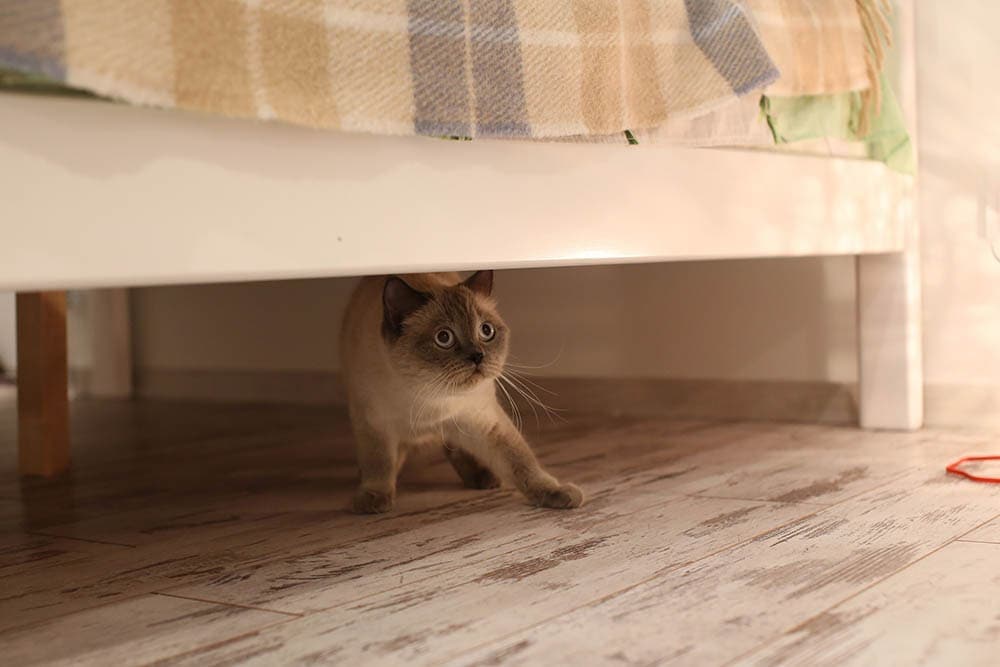
Final Thoughts
Most cats love it when you rub their ears and it’s where scent glands are located. The glands release pheromones, which the cat uses to communicate and mark their territory.
Cats express affection and intimacy when they transfer their scent by rubbing their bodies against us. So, stroking their ears may generate trust and intimacy while strengthening the bond in your relationship, and most cats find it very pleasurable.
However, being gentle when stroking your kitty’s ears is advisable. They are very sensitive, and rubbing them too hard could cause pain and discomfort.
Knowing how to judge your cat’s reaction is also imperative. Felines are not always in the mood for human interaction, and failing to respect boundaries can land you in trouble.
Featured Image Credit: Gumpanat, Shutterstock




